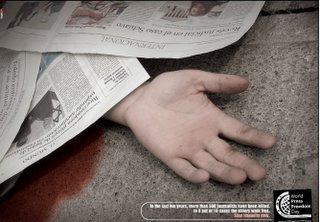2005 proved to be another deadly year for Filipino journalists. The New York-based press freedom watchdog the
Committee to Protect Journalists (CPJ) counted four journalist killings in the country last year. Our organization, the Manila-based
Center for Media Freedom and Responsibility however had a higher count, with 6 journalists murdered in the line of duty in 2005.

As CPJ noted in its latest
analysis of journalist killings around the world, the murders last year were lower compared with the eight recorded in 2004 (CMFR however listed only six killings in 2004).
Despite the lower number of journalist killings in the country last year, as well as the conviction of the killer of Pagadian journalist Edgar Damalerio (see CMFR
report on the conviction), this does not mean that we should stop being vigilant and monitor any attacks against and threats to the press freedom in the country. As noted in a CMFR
study last year on the journalist killings from 2000 to 2005, “the threat to press freedom and the danger to journalists will continue for as long as a culture of impunity remains.”

Here is CPJ’s latest
analysis of the killings worldwide. The Philippines was the deadliest place for journalists in 2005, next to Iraq, CPJ said in its analysis.
Thanks to the Toronto-based press freedom network
International Freedom of Expression Exchange for posting CPJ’s analysis in their website.
By the way, the photo above, which highlighted the high number of journalist killings in 2004, was an advertising material taken from the World Press Freedom Day
website.From Iraq to the Philippines, murder is top cause of journalist deaths in '05Death toll is 47 worldwide; Iraq becomes deadliest recent conflictKidnappers in Iraq, political assassins in Beirut, and hit men in the Philippines made murder the leading cause of work-related deaths among journalists worldwide in 2005, a new analysis by the Committee to Protect Journalists (CPJ) shows. Forty-seven journalists were killed in 2005, more than three-quarters of whom were murdered to silence their criticism or punish them for their work, CPJ's annual survey found. That compares with 57 deaths in 2004, just under two-thirds of which were murders.
Iraq, the most dangerous place for journalists in 2005, also became the deadliest conflict for the media in CPJ's 24-year history. A total of 60 journalists have been killed on duty in Iraq from the beginning of the U.S.-led invasion in March 2003 through the end of 2005. The toll surpasses the 58 journalists killed in the Algerian conflict from 1993 to 1996.
CPJ's analysis also documented a long-term trend - those who murder journalists usually go unpunished. Slayings were carried out with impunity about 90 percent of the time in 2005, a figure consistent with data collected by CPJ over more than a decade. Less than 15 percent of journalist murders since 1992 have resulted in the arrest and prosecution of those who ordered the killings.
A complete list of journalists killed, along with details about each case, is available at:
http://www.cpj.org/killed/killed05.html
Although the 2005 toll reflected a decline from the previous year, it was still well above the annual average of 34 deaths that CPJ has documented over the past 10 years. In fact, 104 journalists were killed in 2004 and 2005, making it the deadliest two-year period since the war in Algeria raged a decade ago.
"Too many journalists have lost their lives just because they were doing their jobs, and unresponsive governments bear responsibility for the toll," CPJ Executive Director Ann Cooper said.
"The war in Iraq might lead one to think that reporters are losing their lives on the battlefield. But the fact is that three out of four journalists killed around the world are singled out for murder, and their killers are rarely brought to justice. It's a terrible indictment of governments that let warlords and criminals dictate the news their citizens can see and hear."
Iraq accounted for 22 deaths in 2005, or nearly half of the year's total, CPJ found. Yet even in that conflict zone, murder accounted for more than 70 percent of the deaths documented by CPJ. The prevalence of targeted killings reflected the evolving threat in Iraq, where crossfire had been the leading cause of death the previous two years. Fatal abductions emerged as a particularly disturbing trend as at least eight journalists were kidnapped and slain in 2005, compared with one fatal abduction the previous year.
Iraqi journalists bore the brunt of these attacks as it became increasingly hazardous for foreign reporters and photojournalists to work in the field. American freelancer Steven Vincent was the only foreign journalist to be killed in Iraq in 2005; five foreigners died there a year earlier.
At least three journalists were killed as a result of fire from U.S. forces, compared with six such deaths in 2004. U.S. forces' fire has killed 13 journalists between March 2003 and the end of 2005. An analysis of casualties in Iraq is available at:
http://www.cpj.org/Briefings/Iraq/Iraq_danger.htmlThe Philippines, where outspoken radio journalists have been murdered in alarming numbers, was the second deadliest place in 2005. CPJ documented four murders in the Philippines, a decline from the eight recorded in 2004. The drop was due in part to more concerted national law enforcement, CPJ's analysis found.
Six countries recorded two deaths each in 2005. Prominent Lebanese columnists Samir Qassir and Gebran Tueni - both of whom were well-known for their biting criticism of the Syrian government and its influence over Lebanon - were killed in separate car bombings in Beirut. A third Lebanese journalist was maimed in another car bombing. The other countries with two killings were Russia, Bangladesh, Pakistan, Sri Lanka, and Somalia.
The Americas showed a marked improvement with four confirmed deaths in 2005, down from eight a year earlier. But many journalists in the region attributed the drop to increased self-censorship, a phenomenon that CPJ found prevalent in Colombia and Mexico.
Two journalists went missing in 2005 - Alfredo Jiménez Mota in Mexico and Elyuddin Telaumbanua in Indonesia. Details about missing journalists are available at:
http://www.cpj.org/Briefings/missing_list.htmlCPJ considers a journalist to be killed on duty if the person died as a result of a hostile action, including retaliation for his or her work; in crossfire while covering war; or while reporting in dangerous circumstances such as a violent street demonstration.
CPJ continues to investigate the cases of 11 other journalists killed in 2005 to determine whether the deaths were work-related. CPJ staff has compiled detailed information on journalists killed around the world since 1992. Statistical information and case capsules are available at:
http://www.cpj.org/killed/killed_archives/stats.htmlKEY POINTS in 2005:a. Forty-seven journalists were killed worldwide in 2005. Of those, 37 (or 79 percent) were murdered. Five journalists died in crossfire during war and another five as a result of dangerous assignments.
b. The war in Iraq accounted for 22 deaths overall. Of the deaths in Iraq, 16 (or 73 percent) were murders.
c. At least eight journalists in Iraq were abducted before they were executed. There was only one such case in 2004.
d. Twenty-one of the 22 journalists killed in Iraq were Iraqis. The only foreigner killed in Iraq was American Steven Vincent.
e. Sixty journalists have been killed in Iraq since the U.S.-led invasion began in March 2003, surpassing the 58 killed during the Algerian war from 1993 to 1996.
f. The Philippines ranked second in deaths worldwide in 2005 with four, a 50 percent drop from the previous year.
g. Two prominent Lebanese columnists critical of the Syrian government were killed in Beirut, both in car bombings.
h. Deaths in the Americas dropped to four from the eight recorded in 2004. Some journalists attributed this to self-censorship, particularly in Colombia and Mexico.
 Talk about politicians who find nothing wrong dabbling in showbiz.
Talk about politicians who find nothing wrong dabbling in showbiz.








